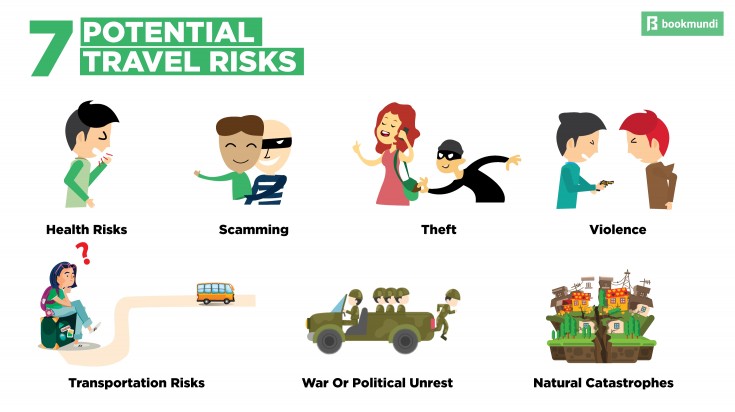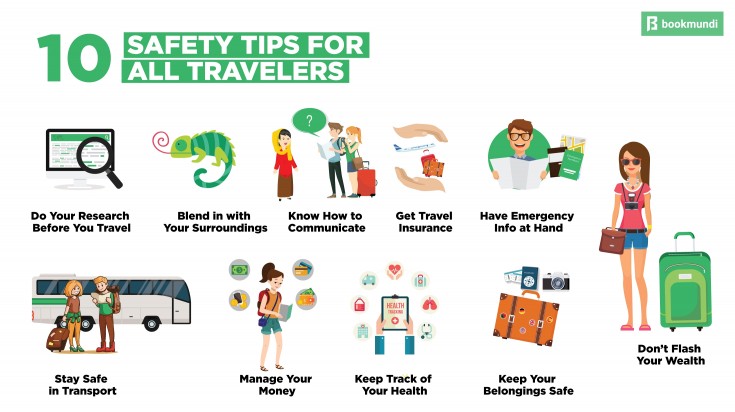Top Travel Safety Tips

- Kimberly G
- From
- Kimberly G
- From
- Maria A
- From
- Stephanie Z.
- From
7 Potential Travel Risks
1. Health risks. Unwanted health issues are a top concern, especially if you are traveling to a country where diet and hygiene is vastly different to what you are used to. Conditions like stomach flu, vomiting and diarrhea can quickly ruin a trip. In lieu of COVID-19, it is a genuine travel risk that you don't want to ignore. Stay up to date with latest news regarding the pandemic in the country you are planning to travel to.
2. Scamming. Travelers run the risk of becoming potential targets for scammers, especially if you don’t speak the language or are unfamiliar with the culture.
3. Theft. Nothing will spoil your globe-trotting shenanigans like getting your passport, money or other valuables stolen.
4. Violence. Travelers may find themselves getting caught in a violent crime, particularly if you are unaware of the locations that you are venturing into.

5. Transportation risks. Transportation problems can be another issue, especially if you are traveling to a country that is notorious for transport accidents, has complicated (or nonexistent) public transport schedules or is known for its traffic congestion.
6. Natural catastrophes. Depending on where you are traveling, disasters such as earthquakes, typhoons, hurricanes and other unforeseen natural disasters could arise.
7. War or political unrest. Although much less common than other risks, depending on the country or region you are traveling to, political risks could pose a problem.
10 Tips for a Safe Travel
1. Do your research before you travel. First rule of safe travel — don’t be ignorant about where you are going. Make an effort to learn about the country, the political situation, the cultural norms, the safest spots for travelers, safe accommodations to stay and the areas or regions that are best avoided. Head off on your trip with your eyes wide open to avoid surprises.
2. Blend in with your surroundings. Once you’ve done your research, you can start your visit to a new destination as if you were one of the locals. This is not only sound exploration advice, but a good safety tip as well. You’ll make yourself more vulnerable to con artists if you stick out like a sore thumb with your massive backpack, two cameras and confused look on your face. and you will draw much less attention if you make an effort to blend in. You also don’t want to disrespect or offend with improper dress or manners. If you’re visiting places of worship, make sure to dress modestly in order to prevent upsetting the locals.
3. Don’t flash your wealth. Whether this is with cash or expensive gear, showing wealth will only make you more appealing to scammers and pickpockets. Carry a dummy wallet with little cash in it so that you can give this in case you are mugged.
4. Stay safe in transport. Avoid air travel mishaps by frequently checking whether your flight has been rescheduled or cancelled. When using bus services, make sure to go with trusted companies that are have many reviews online. Moreover, try booking your tickets in advance whenever possible, so you don’t end up stranded on remote bus stops with no transport in sight. If you are hiring local taxis, agree upon the fare in advance in case the vehicle doesn’t have a meter. Also, carry a map with you to avoid getting lost.
5. Keep your belongings safe. Avoid carrying too many luggage pieces and invest in a small sturdy lock for your luggage. Try to choose one that doesn’t stand out, so it doesn’t appear as if you have something really valuable inside. If you have a hand-carry with you, never leave it unattended. Buy wallets that have RFID protection to avoid identity theft. If you're staying at a hotel, choose ones that have safety lockers in their rooms.

6. Get travel insurance. Regardless of whether you are a natural worrier or not, don’t hesitate to take out travel insurance. Not only will insurance cover any unexpected injuries and trips to the hospital, it can also protect you from theft or loss of personal belongings.
7. Have emergency info at hand. This should entail contact numbers for the local emergency services (police, fire department and ambulance) and for your country’s embassy (if there is one in the place you’re visiting).
8. Manage your money. If you plan on using your debit and credit cards, make sure to notify your bank in advance that you’ll be abroad, or you may find your card blocked for suspicious activity. Research beforehand where are the best spots to exchange your money into local currency as ATMs might be scarce in certain places. When out and about, always carry a small amount of cash with you.
9. Keep track of your health. Make sure to have a supply of any over-the-counter essentials like motion sickness pills, probiotics, pain killers and bug repellants. Consult your doctor and get the proper vaccines before traveling. Ensure that any prescription pills are filled for some days extra than the intended length of your travel. If you choose to hike or walk long distances, make sure to carry energy bars and light snacks to maintain energy, along with water to prevent dehydration.
10. Know how to communicate. Learn the basic emergency phrases like “I need help”, “Where is the nearest hospital/police station/embassy?” etc. in the local language.
Solo Travel Safety Tips
 See more
See moreSafety tips for women travelers
 See more
See moreSafety tips for traveling with children
 See more
See moreSafety tips for backpackers and budget travelers
 See more
See moreFive smartphone apps for safe travel
 See more
See moreFinal Checklist for Traveling Safely
Before traveling, it is always good to make that last check before you head through the door. Here’s a quick list to help you dot the i’s and cross the t’s.
- Travel essentials such as passport, visas, travel insurance documents, money, credit cards and tickets. Make sure to take some extra passport size photos with you.
- Copies of all important documents, kept in a different spot than the actual documents.
- Travel itinerary and maps or guide books of all the places you will be visiting.
- A list of all the pertinent contact information, including emergency services, embassies and consulates.
- Accommodation information and reservations.
- Comfortable clothes that are weather and culture appropriate.
- Painkillers, sunscreen, probiotics, insect repellant and other medical must-haves, including any prescription medicines.
- Tech essentials such as a phone, charger, adapter, headphones etc.
- Hand-sanitizer, wipes, diapers or other hygiene essentials.
- Female hygiene products if needed.
Make sure all of these are safely packed in your suitcases and backpacks, and you can rest assured your travels will be made easier and more enjoyable.
Regardless of whether you’re traveling on your own, among friends, with your partner or children, these top travel safety tips will help give you peace of mind and allow you to fully surrender yourself to the joy and excitement of traveling. Now, hit the road! Lastly, while wanting to be safe while you are traveling, you will likely also want to safeguard your own home while traveling. In this regard, Vivint Home Security provides some good advice.
